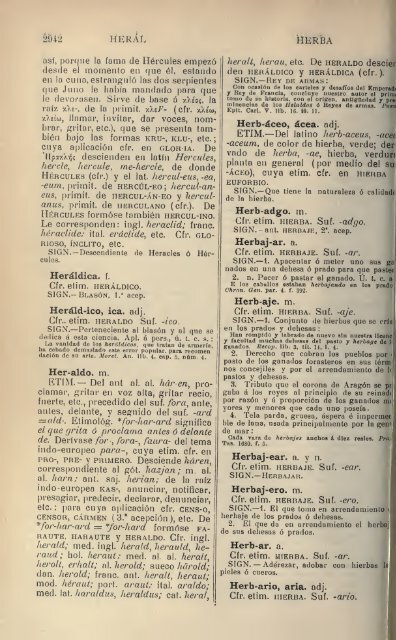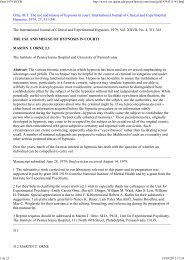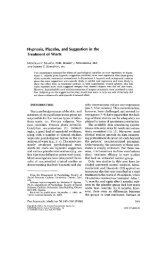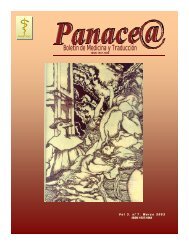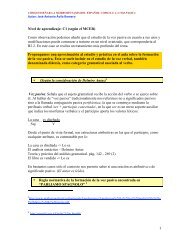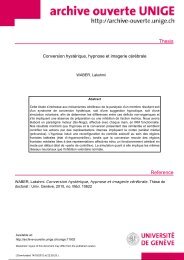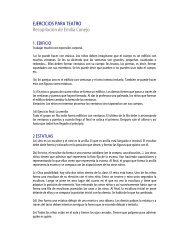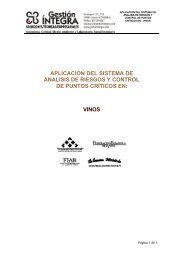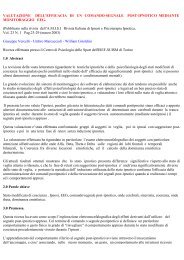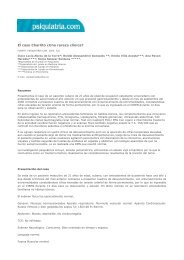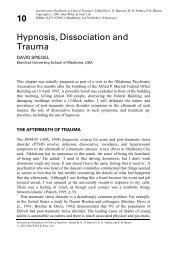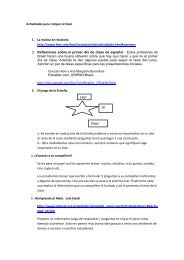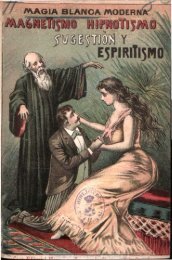Diccionario filológico-comparado de la lengua castellana
Diccionario filológico-comparado de la lengua castellana
Diccionario filológico-comparado de la lengua castellana
You also want an ePaper? Increase the reach of your titles
YUMPU automatically turns print PDFs into web optimized ePapers that Google loves.
^^42 MHRAL HERBA<br />
osí, porque <strong>la</strong> fama <strong>de</strong> Hércules empezó<br />
<strong>de</strong>s<strong>de</strong> el momento en f(ue él, estando<br />
en <strong>la</strong> cuna, estranguló <strong>la</strong>s dos serpientes<br />
que Juno le había mandado para que<br />
le <strong>de</strong>vorasen. Sirve <strong>de</strong> base á y.Aéo;, <strong>la</strong><br />
raíz vlí-, <strong>de</strong> <strong>la</strong> ])rimit. aIíF- (cír. xXéo),<br />
v.líi(ji, l<strong>la</strong>mar, invitar, dar voces, nombrar,<br />
o ri<strong>la</strong>r, etc.), que se presenta también<br />
bajo <strong>la</strong>s formas kru-, klu-, etc.<br />
cuya aplicación cfr. en gloria. De<br />
'Hpay.Av^? <strong>de</strong>scien<strong>de</strong>n en <strong>la</strong>tín Hercules,<br />
liercle, hercule, me-hercle, <strong>de</strong> don<strong>de</strong><br />
Hércules (cfr.) y el <strong>la</strong>t. Iiercul-eus, -ea,<br />
-eum, primit. <strong>de</strong> hercúl-eo; hercul-aneus,<br />
primit. <strong>de</strong> hercul-án-eo y liercu<strong>la</strong>nus,<br />
primit. <strong>de</strong> hercu<strong>la</strong>no (cfr.). De<br />
Hércules formóse también hercul-ino.<br />
Le correspon<strong>de</strong>n: ingl. heraclid; franc.<br />
héracU<strong>de</strong>; ifal. erácli<strong>de</strong>, etc. Cfr. glorioso,<br />
ÍNCLITO, etc.<br />
SIGN. — Descendiente <strong>de</strong> Heracles ó Hércules.<br />
Heráldica, f.<br />
Cfr. etim. heráldico.<br />
SIGN.— B<strong>la</strong>són. 1." acep,<br />
Heráld-ico, ica. adj.<br />
Cfr.. etim. heraldo Suf. -ico.<br />
SIGN.— Perteneciente al b<strong>la</strong>són y al que se<br />
<strong>de</strong>dica á esta ciencia. Api. á pers., ú. t. c. s. :<br />
La vanidad <strong>de</strong> los heráldicos, que tratan <strong>de</strong> armería,<br />
ha cebado <strong>de</strong>masiado este error popu<strong>la</strong>r, para recomen'<br />
dación <strong>de</strong> su arte. Moret. An. lib. 4. cap. 5, núm. 4.<br />
Her-aldo. m. |<br />
ETIM.— Del ant al. al. hár en, proc<strong>la</strong>mar,<br />
irritar en voz alta, gritar recio,<br />
fuerte, etc., ¡precedido <strong>de</strong>l suf. fora, ante,<br />
antes, <strong>de</strong><strong>la</strong>nte, y seguido <strong>de</strong>l suf, -ard<br />
=ald-. Etimológ. */br-har-ard significa<br />
el que grita ó proc<strong>la</strong>ma antes ó <strong>de</strong><strong>la</strong>nte<br />
<strong>de</strong>. Derívase for , fora-., faura- <strong>de</strong>l tema<br />
indo-europeo para-, cuya etim. cfr. en<br />
PRO-, pre- y PRIMERO. Descien<strong>de</strong> liaren,<br />
correspondiente al gót. liasjan ; m. al.<br />
a!. Iiarn; ant. snj. herian; <strong>de</strong> <strong>la</strong> raíz<br />
indo-europea kas-, anunciar, notificar,<br />
presagiar, pre<strong>de</strong>cir, <strong>de</strong>c<strong>la</strong>rar, <strong>de</strong>nunciar,<br />
etc.; para cuya a|»licación cfr. cens-o,<br />
CENSOR, CARMEN ( 3." acepcióu ), etc. De<br />
*for-har-ard = *for-hard formóse faraute,<br />
HARAUTE y HERALDO. Cfr. ingl.<br />
herald; med. ingl. herald, herauld, heraud;<br />
bol. heraut; med. al. al. heralt,<br />
herolt, erlialt; al. herold; sueco harold;<br />
dan. herold; franc. ant. heralt, heraut;<br />
mod. heraut; port. araut; ital. araldo;<br />
med. <strong>la</strong>t. haraldus, heraldus; cat. heraL<br />
'<br />
j<br />
heralt, herau, etc. De heraldo <strong>de</strong>scier<br />
<strong>de</strong>n HERÁLDICO y heráldica (cfr.).<br />
SIGN.— Rey <strong>de</strong> armas:<br />
Con ocasión <strong>de</strong> los carteles y <strong>de</strong>safíos <strong>de</strong>l Emperadi<br />
y Rey <strong>de</strong> Francia, concluye nuestro autor el primí<br />
tomo <strong>de</strong> su historia, con el origen, antigüedad y pre.<br />
minencias <strong>de</strong> los He<strong>la</strong>ldos ó Reyes <strong>de</strong> armas. Puen<br />
Kpit. Cari. V. lib. 16. §§. 11.<br />
Herb-áceo, ácea. adj.<br />
ETIM.— Del <strong>la</strong>tino herb-aceus, -aceí<br />
-aceum, <strong>de</strong> color <strong>de</strong> hierba, ver<strong>de</strong>; <strong>de</strong>r<br />
vado <strong>de</strong> herba, -ae, hierba, verdun<br />
p<strong>la</strong>nta en general (por medio <strong>de</strong>l su<br />
-ÁCEo), cuya etim. cfr. en hierba<br />
EUFORBIO.<br />
SIGN.— Que tiene <strong>la</strong> naturaleza ó cal¡dad(<br />
<strong>de</strong> <strong>la</strong> hierba.<br />
Herb-adgo. m.<br />
Cfr. etim. hierba. Suf. -adgo.<br />
SIGN. -ant. herbaje, 2*. acep.<br />
Herbaj-ar. a.<br />
Cfr. etim. herbaje. Suf. -ar.<br />
SIGN.— i. Apacentar ó meter uno sus ge<br />
nados en una <strong>de</strong>hesa ó prado para que pastei<br />
2. n. Pacer ó pastar el ganado. Ú. t. c. a.<br />
E los caballos estaban herbajando en los prado<br />
Chrnn. Gen. par. 4. f. 3'J2.<br />
Herb-aje. m.<br />
Cfr. etim. hierba. Suf. -aje.<br />
SIGN.—1. Conjunto <strong>de</strong> hierbas que se cría<br />
en los prados y <strong>de</strong>hesas :<br />
Han rompido y <strong>la</strong>brado <strong>de</strong> nuevo sin nuestra licene<br />
y facultad muchas <strong>de</strong>hesas <strong>de</strong>l pasto y herbage <strong>de</strong> !<br />
ganados. Recop. lib. 3, tít. 14, 1. 4.<br />
2. Derecho que cobran los pueblos por i<br />
pasto <strong>de</strong> los ganados forasteros en sus térra<br />
nos concejiles y por el arrendamiento <strong>de</strong> U<br />
pastos y <strong>de</strong>hesas.<br />
3. Tributo que el corona <strong>de</strong> Aragón se pi<br />
guba á los reyes al principio <strong>de</strong> su reinada<br />
por razón y á proporción <strong>de</strong> los ganados m<<br />
yores y menores que cada uno poseía.<br />
4. Te<strong>la</strong> parda, gruesa, áspera ó impermei<br />
ble <strong>de</strong> <strong>la</strong>na, usada principalmente por <strong>la</strong> geni<br />
<strong>de</strong> mar:<br />
Cada vara <strong>de</strong> herbajes anchos k diez reales. Prot<br />
Tas. 1680. f. 5.<br />
Herbaj-ear. a. y n.<br />
Cfr. etim. herbaje. Suf. -ear.<br />
SIGN.— Herbajar.<br />
Herbaj-ero. m.<br />
Cfr. etim. herbaje. Suf. -ero.<br />
SIGN.— 1. El que toma en arrendamiento<br />
herbaje <strong>de</strong> los prados ó <strong>de</strong>hesas.<br />
2. El que da en arrendamiento el herbé:<br />
<strong>de</strong> sus <strong>de</strong>hesas ó prados.<br />
Herb-ar. a,<br />
Cfr. etim. hierba. Suf. -ar.<br />
SIGN. — A<strong>de</strong>rezar, adobar con hierbas Ifi<br />
pieles ó cueros.<br />
Herb-ario, aria. adj.<br />
Cfr. etim. hierba. Suf. ano.


